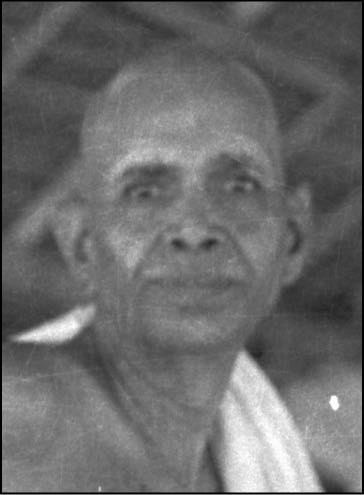Spiritual-Teaching.org
Letter #10 - The First Rung
on the Ladder
So, where does one start?
It starts with an attitude. We are our own worst enemies. Our view of ourselves is, more often than not, quite different from the way others see us. We may think we are clever and people do not notice our idiosyncrasies. They do but mostly they do not care or have the words or desire to call us out. Unless they are journalists or someone who enjoys dishing the dirt on others, then it is a case of the more lurid the fallibilities the better.
If others can do it, why can’t we expose our shortcomings and be free of the tedious burden of hiding them with one excuse after another? It is all about harmony.
Harmony within our body, heart and mind. If we are out of kilter, we know even if we do not wish to acknowledge the cause.
We are on the cusp between psychology and spirituality and they should not be confused. Psychology is necessary to understand the mechanism of the mind while spirituality is, so to speak, a springboard into a realm beyond the conditioned manifestation of our unconscious desires and fears. We are a machine that acts according to its genetic code, and the various influences which are brought to bear on us as we leave childhood and enter adulthood through that tempestuous land of adolescence. Spirituality is the recognition of the means to transcend our limitations as a human being. We believe there is a higher reality unfettered by our belief that we are a human body with a mind and its consequent machinations.
Returning to our predicament and the cards that we have been dealt. We take pleasure in other people’s failings or disasters. We think we could not possibly do that which they did, nor can our behaviour be as ridiculous as another’s. We are invariably better. But we are not. We all suffer from similar conditions though the scenario may differ. That is why we watch dramas and comedies, to see how others fare and to subconsciously take notes. Throughout human history, The Mahabharata, the Greek tragedies and comedies, the Icelandic sagas of struggles and conflicts within kingdoms and families, African folklore using animal fables to teach guidelines, the 11th century Japanese The Tale of Genji, to the modern, sublime Four Quartets by TS Eliot, the list is endless….all speak of the human predicament of how to be in harmony with ourselves, society and the environment in whatever shape or form. Some people solve it by making money, preferably lots of it.
That solves their problem because they can buy their way out of most crises. Others do exactly the opposite, and give away all they possess that is not necessary for survival, thereby absolving themselves of any responsibility beyond their limited dimensions either physical, emotional or mental. The rest of us are middling between both poles. We are always learning whatever the situation and evolving a more sophisticated strategy to protect ourselves from suffering.
When we stop, take it on board, and apply the lesson, the gap between the thought and the action arises. “Between the idea/ And the reality/Between the motion/And the act/ Falls the Shadow.” 1 We may wish to do the right thing. We may wish to alter our habits which are detrimental to our well-being, but to our astonishment and resultant despair, we typically cannot. In a moment of crisis, the golden words arise: “There must be another way.”
We realise that if our attitude is one of avoidance, it will never end. We will go round and round in circles trying to learn the same lesson in different guises repeatedly. There is a basic theme which predominates in our lives. Each person is different and has a specific theme wholly their own but the principles are the same.
Otherwise, how could we apply the wisdom of the ages to our own?
Our attitude then is crucial. If our attitude is that it is someone else's fault we are lost. If we accept responsibility for our actions then there is a chance to be liberated from the ignorant, invisible web which suffocates us.
By responsibility, we do not mean the obvious ones where we are called out by a member of the family, an associate or invariably, an enemy for our public shortcomings but also all actions in which we are involved however peripheral. We all contribute to situations that evolve. For example, our politicians are to some extent reflections of our group aspirations. Each nation has a leader who replicates what the majority may think or feel.
We are the world and what we do or think affects, in however minuscule a way, everything and everyone else. Once we accept responsibility in whatever form it may arise, we have taken the first valuable step on the ladder.
When I first came to Arunachala, my head was full of fabulist thoughts. I had an unrealistic opinion of myself that others who were there at Arunachala proceeded to point out in kind of subtle and not-so-subtle ways. It was painful but necessary. We sometimes read that we should be thankful to others for pointing out our defects.
This is all very well in theory but the reality is another country. Bitterness is often the result of the purging.
But that will pass if we persist.
Which brings us back to a critical point. Concurrent with the acceptance of responsibility in however microscopic a manner, the overriding principle has been set in place. A principle is not a question of quantity but of quality. If we can do a simple task such as sweeping the floor well, it is a momentous start. If we can wash a dish immaculately, it is a start. We begin on the most mundane, simple level. We bring to bear all our attention on doing the humblest task well. We start at zero.
What we do discover is that even when we try to do the simplest task, our attention wavers. I remember reading a book that stated the claim that even to keep our focus on the dials of a watch for one minute is impossible. I tried it and much to my disbelief, failed. If I could not do that, how ever could I follow a train of thought back to its source using the technique of Who Am I?
In those first months at Arunachala, I realised that I was a bundle of undisciplined nerves that fired off unconscious, unintelligent reactions, I could not help myself and was a victim of my delusions.
But two valuable insights arose from the turmoil. One, I was responsible for who I was no matter the circumstances, for nobody got me into the emotional mess I found myself in except me. And two, I realised an instrument was required to focus the mind on fighting the raging war beneath the surface. The Bhagavad Gita was not wrong. We are at war with ourselves. The question is how do we overcome our adversities? And for that, we need to know what they are.
We are oblivious to the currents around us that we inadvertently create. We live mostly in our dream world. Until we become desperate to awaken, we cannot escape. And to do that, we require the power of attention. It is like a muscle. If we exercise a muscle, it can grow stronger and more resilient. If we do not exercise our power of discrimination, it becomes flabby and inconsequential.
In the case of many, it was the power of Arunachala Ramana that became the fulcrum of the breakout.
_______________________
1 TS Eliot, The Hollow Men.




